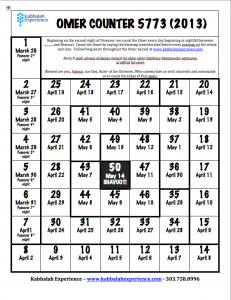 This week of Passover is distinguished by what we eat and what we don’t eat. We remove Chametz (all leavened products) and eat the flat bread—Matzah.
This week of Passover is distinguished by what we eat and what we don’t eat. We remove Chametz (all leavened products) and eat the flat bread—Matzah.
Kabbalah provides a number of explanations as to the inner meaning of matzah and chametz. The most common explanation, also alluded to in traditional Jewish teaching, is that the “puffed up” nature of chametz symbolizes the character trait of arrogance. The flat, unleavened matzah represents humility. Humility is the beginning of liberation and the foundation of spiritual growth. When we eat matzah, we internalize the quality of humility as the essence of faith. By not eating chametz we rid ourselves of arrogance and self-centeredness.
The symbolism we will look at connects us more to the dimension of time rather than the dimension of space–how much space does my arrogance take up? Matzah and chametz can be understood in their relationship to time, specifically to procrastination.
The contribution of Kabbalah (and Chassidut) to our observance of the Passover laws–what we eat and don’t eat–is to make the experience an internal one—not simply ingestion (or indigestion as the case may be) rather it is “digestion” as in the definition, “to think over so as to understand, absorb or assimilate.” We change our eating habits to become aware of the symbolism of what we digest. In turn, we move to action based on our understanding and new awareness.
So what does matzah and chametz have to do with procrastination? To procrastinate, which comes from the Latin root “cras” meaning tomorrow, is the quintessential quality of chametz. Procrastination is the attitude of why do it today when you can (maybe) get to it tomorrow. While there can be logic in waiting and sequencing tasks the idea of chametz helps connect us with what occurs when we let time itself become leavened—if the proper time to engage in something is now—then be engaged in it now. This lines up with a famous saying in the Talmud—A Mitzvah that presents itself—don’t let it become chametz! This phrase is usually translated as don’t let it pass you by—using the meaning of chametz as procrastinate—it then would mean, don’t put it off till tomorrow.
Matzah re-presents the opportunities that are present now. Each spring we have the opportunity to look afresh at living in the moment and not burdening ourselves by letting the present become bloated as it takes on a life of the tomorrows that never resolve.
The counting of the Omer—a 50 day spiritual cleanse can focus on any of a number of character traits—including arrogance or as will be suggested—our relationship with living in the present and not living in procrastination. For those new to the counting of the Omer, each week (there are seven total) from Passover to the holiday of Shavuot (marking the traverse of the Israelites from Egypt to Mount Sinai) is aligned with one of the Sefirot from the Tree of Life—(the order is Chesed-Gevurah-Tiferet-Netzahc-Hod-Yesod and Malchut).
Each of us could take an accounting of those things we are procrastinating. I started on a list and it was easy (and rapid) to get beyond 50 (including procrastinating on working on my arrogance). You can try and tackle more than one example or area of procrastination—or choose one; the key is to use the count to create change—not just in attitude but in action. The final week of the count—Malchut—represents manifesting the change—that is the goal.
Each week has its general intention in the process of change (each day has its specific intention). The first week—Chesed is about loving kindness. Usually this energy is seen as giving to others, but it also means giving love to oneself. In the context then of change around procrastination we take a full week to be loving to ourselves first—we will be demanding next week. The questions this week are—what am I really willing to take on?—to commit to? and can I be kind to myself in the process? To succeed at change is to do so out of recognition that I can love myself more if I stop or start____________ (fill in the blank) and that I also need first to love myself as I am. That serves us well as a start to a commitment to change. The week of Gevurah is about focus and definition—placing realism on the change and setting up a plan—what to work on etc.
In order to get us all started on Day 1 of the Omer count this blog needed to be ready and out yesterday—but I procrastinated. So, it is out today—the day of Gevurah in Chesed (this whole week is Chesed and the other Sefirot modify each day).
Today is a good day to reflect on what you may want to work on—and to reflect on how the change or changes you are considering are loving to yourself and to others.
In anticipation of Rodger Kamenetz’s presentation on Dreamwork at our fundraising event (don’t let that opportunity become chametz) a number of us have been paying close attention to our nightly dreams. If you want to remember dreams it is very useful to get into the habit of writing them down (and not delaying!) upon awakening. This holds true for any of our commitments to change—so keep a log, write down what you are committing to and keep a journal on your process and progress. And pay attention to your dreams.









2 Comments
Peggy Brody · March 28, 2013 at 12:20 pm
I thought this particularly poignant. Thank you!
Ruth Neubauer · March 30, 2013 at 8:04 pm
Ditto.
Just the right mix of clarity and mysticism.
I loved this.
Ruth